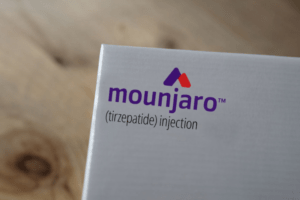Managing your weight and overall health with Mounjaro requires more than just taking the medication. Have you ever wondered if pairing it with the right diet could maximise your results? If so, you’re in the right place. This guide will help you navigate the dos and don’ts of eating while on Mounjaro, ensuring you get the best results.
What is Mounjaro and How Does it Work?
Mounjaro (Tirzepatide) is a cutting-edge medication manufactured to help regulate blood sugar levels in people with Type 2 diabetes. It works by activating GLP-1 and GIP receptors, hormones that regulate appetite and insulin sensitivity. But here’s the catch: its effectiveness doesn’t stop at just taking the injection. Your diet plays a pivotal role in complementing its benefits.

Why Diet Matters While on Mounjaro?
Imagine trying to fill a bucket with water while it has holes in it. Not following a proper diet while on Mounjaro is like leaving those holes unpatched. A balanced diet enhances the medication’s impact by improving blood sugar stability, promoting weight loss, and preventing common side effects like nausea.
Best Foods to Eat While on Mounjaro
Choosing the right foods can amplify the effects of Mounjaro. Here’s what your plate should look like:

1. High-Quality Proteins
Protein is your best friend when it comes to managing appetite and preserving muscle mass. Opt for lean meats like chicken and turkey, fatty fish like salmon, and plant-based sources such as lentils and chickpeas.
“A diet rich in lean protein helps curb hunger, keeping you full and satisfied,” says Dr. Jane Parker, a nutritionist specialising in diabetes care.
2. Non-Starchy Vegetables
Leafy greens, broccoli, cauliflower, and zucchini are low in carbs but high in fibre. They not only stabilise blood sugar but also add bulk to meals, making you feel fuller for longer.
3. Whole Grains and Complex Carbohydrates
Think quinoa, brown rice, and oats. Unlike refined carbs, these options release energy slowly, helping to avoid blood sugar spikes.
4. Healthy Fats
Incorporate avocados, nuts, seeds, and olive oil. These fats not only promote heart health but also help you feel satisfied after meals.
5. Hydrating and Low-Calorie Beverages
Water is essential, but you can also include herbal teas and infused waters. Staying hydrated supports digestion and reduces the likelihood of overeating.
Foods to Avoid While on Mounjaro
Some foods can hinder your progress. Avoid these pitfalls to stay on track:

1. Sugary Treats and Beverages
Sodas, sweets, and pastries may cause blood sugar spikes and interfere with weight loss. Replace them with naturally sweet options like fruits.
2. Processed Foods
Ready-to-eat meals and snacks often contain unhealthy fats, excess sodium, and added sugars, making them a poor choice for your Mounjaro journey.
3. Refined Carbs
White bread, pasta, and pastries are stripped of nutrients and may destabilise blood sugar levels.
4. Trans Fats
Steer clear of margarine, fried foods, and baked goods made with hydrogenated oils. These not only harm your heart but also add empty calories.
5. Excessive Alcohol
Alcohol can interfere with your body’s ability to regulate blood sugar, and it’s often high in empty calories. If you drink, do so in moderation.
Tips for Sticking to the Mounjaro Diet
Staying consistent can be challenging. Here are some practical strategies to help:
1. Plan Your Meals
Dedicate some time each week to meal planning and preparation. This reduces the temptation to resort to unhealthy options.
2. Practise Portion Control
Even healthy foods can contribute to weight gain if consumed in large quantities. Use smaller plates or portion out snacks to avoid overeating.
3. Listen to Your Body
Mounjaro often reduces appetite, so pay attention to your hunger signals. Eat when you’re hungry and stop when you’re satisfied.
4. Manage Side Effects
To counter nausea, a common side effect of Mounjaro, stick to bland, easily digestible foods like crackers or ginger tea.
5. Track Your Progress
Use apps or journals to monitor your meals, weight, and how you feel. This can provide insights into what works best for your body.
Takeaways
Can a mindful diet truly boost the effectiveness of Mounjaro? Absolutely! By focusing on nutrient-dense foods and avoiding common dietary pitfalls, you’re not just supporting the medication—you’re setting yourself up for long-term success.
Ready to take the first step? Start by making small changes today, like swapping sugary snacks for a handful of nuts or adding an extra serving of vegetables to your dinner. Remember, the journey is yours, but you’re not alone. Mounjaro and the right diet are your partners in health.
FAQs
- What is Mounjaro, and how does it help with weight loss?
Mounjaro (Tirzepatide) is a prescription medication originally developed for managing Type 2 diabetes. It works by regulating gut hormones to control blood sugar levels and suppress appetite, making it easier to reduce calorie intake and lose weight.
- Can I eat carbs while using Mounjaro?
Yes, but focus on complex carbohydrates such as whole grains, quinoa, and oats. Avoid refined carbs like white bread and sugary snacks, as they can lead to blood sugar spikes and cravings.
- Do I need to follow a specific diet plan while on Mounjaro?
Although there’s no strict diet required, it’s recommended to follow a balanced, nutrient-dense diet with lean proteins, healthy fats, non-starchy vegetables, and whole grains. Avoid sugary, fried, and overly processed foods.
- Is exercise necessary when using Mounjaro?
Exercise isn’t mandatory but is highly recommended. Physical activity helps improve overall health, boosts metabolism, and complements the weight-loss benefits of Mounjaro.
- Can I drink alcohol while taking Mounjaro?
It’s best to limit alcohol consumption as it can disrupt blood sugar levels and add empty calories, which may hinder your progress.
- Are there any side effects of Mounjaro I should be aware of?
Common side effects include nausea, diarrhoea, and decreased appetite. These often improve over time, but consult your doctor if they persist or worsen.
- How much water should I drink while on Mounjaro?
Staying hydrated is crucial. Aim for at least 8-10 glasses of water per day, and consider hydrating foods like cucumbers and watermelon to support overall health.
- Can vegetarians or vegans use Mounjaro effectively?
Absolutely! Vegetarians and vegans can focus on plant-based proteins like tofu, lentils, chickpeas, and quinoa, alongside plenty of vegetables, fruits, and healthy fats.
- How quickly can I expect results with Mounjaro?
Results vary, but many users notice a gradual weight loss within the first few weeks. The pace depends on factors like your diet, activity level, and adherence to the medication.
- Should I consult a healthcare professional before starting Mounjaro?
Yes, always consult your GP or pharmacist before starting Mounjaro. Our healthcare experts at The Care Pharmacy can also assess your medical history, ensure it suits you, and provide tailored advice to maximise its benefits.
